What’s the Story?
On August 10, 2021, the Coresight Research team attended ASOS’s Capital Markets Day 2021, which was held virtually. In this report, we present three key insights from the event, focused on the company’s supply chain.
ASOS Capital Markets Day 2021: Key Insights
1. Automation of Fulfillment Centers and Expansion of Logistics Network
To drive market share in Europe and globally, ASOS is investing heavily in fulfillment center automation, as well as expanding its logistics network. In the next two years, the company plans to expand its fulfillment centers capacity by around 50%. The company forecasts that this will lead to a total net sales throughput expansion of more than £6 billion ($8 billion).
ASOS is investing £90 million ($123 million) in a new distribution center in Lichfield, Staffordshire, which will handle parcels for its online clothing and beauty business, with a total stockholding capacity of 6 million units. The warehouse spans 437,000 square feet and is set to begin operating by the first half of fiscal 2022, serving customers in the UK and overseas. ASOS expects the new facility to support its growing customer demand and enable the online retailer to expand its delivery capabilities and product offerings. The Lichfield fulfillment center is set to be automated by the second half of fiscal 2023.
Furthermore, ASOS is automating its US warehouse in Atlanta, with the project set to finish by the second half of fiscal 2023 and subsequently increase the warehouse stockholding capacity by 50% to 15.5 million units, with a warehouse throughput of 3.1 million units per week. The company anticipates that this will lead to a total net sales throughput expansion of more than £2.0 billion ($2.7 billion) over the two years following completion.
[caption id="attachment_131285" align="aligncenter" width="725"]
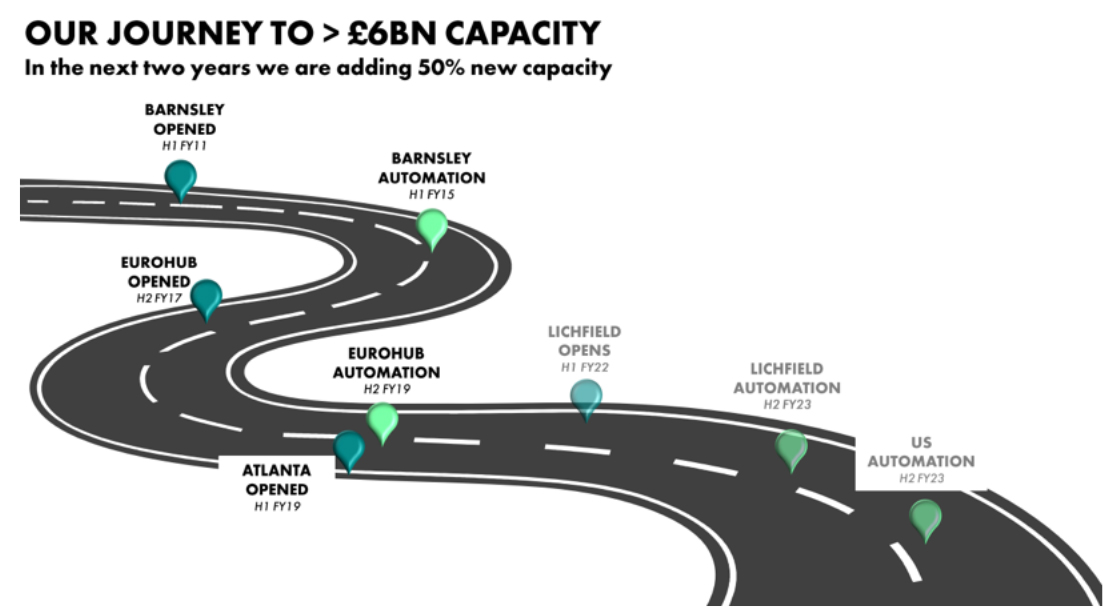 Source: Company reports
Source: Company reports [/caption]
Automation To Drive Efficiency Improvements
ASOS management stated that the automation of distribution centers in Lichfield and Atlanta will significantly enhance the company’s delivery propositions in the UK and the US, respectively, by improving the pick and pack capacity per hour.
The company has already invested £47 million ($64 million) in automating its Euro Hub fulfillment center in Berlin, Germany, which went live in the second half of fiscal 2019. ASOS management stated that the Euro Hub automation had improved the company’s delivery propositions in Germany and France, with a 47% improvement in the number of pick units per hour and a 35% improvement for pack units. Similarly, the company noted that the automation of its Barnsley warehouse in the first half of 2015 improved the number of pick units per hour by 100% and pack units by 32%.
[caption id="attachment_131286" align="aligncenter" width="725"]
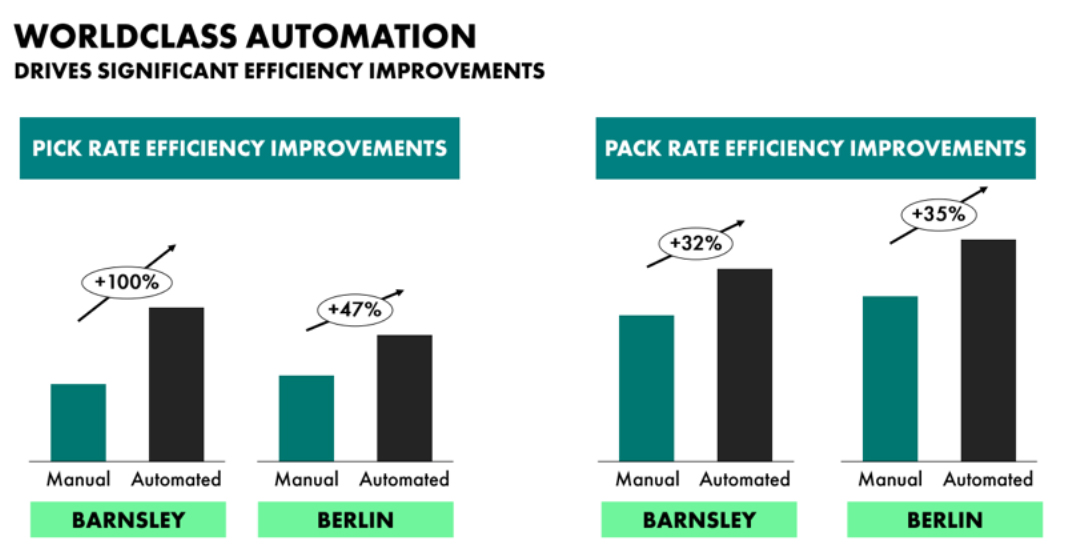 Source: Company reports
Source: Company reports [/caption]
2. Optimizing Transportation
ASOS stated that it is experiencing significant volatility across air and ocean freight services, and the company is looking to maintain a balance between air, road and sea networks to reduce overall transportation costs going forward—and account for sustainability initiatives, which we discuss in the next section. The company noted that the introduction of a combined sea and air route into its network in fiscal 2021 helped generate cost savings on premium airfreight.
As the ocean freight rate spot market has increased by 10 times since early 2020, ASOS has entered into a long-term freight contract with a major shipping line. However, the terms of the contract were not disclosed.
Management also stated that the company has implemented new ports of entry into Europe after facing a shortage of UK drivers of heavy goods vehicles recently.
[caption id="attachment_131287" align="aligncenter" width="725"]
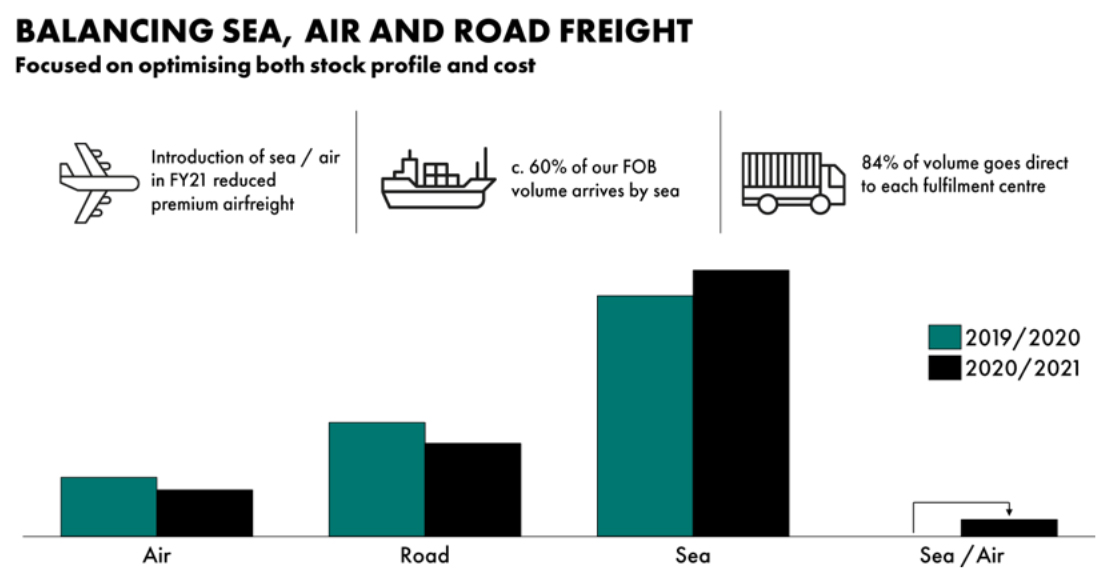 Source: Company reports
Source: Company reports [/caption]
3. Sustainability Remains a Priority
ASOS’s supply chain initiatives will continue to prioritize sustainability, according to company management. For instance, it is prioritizing sea and road routes over air freight for inbound logistics, which is helping to reduce carbon emissions.
In addition, ASOS plans to expand the use of electric vehicles for delivery to more countries. In partnership with France-based parcel delivery service company DPD, the company currently utilizes electric-powered delivery in 10 countries.
Management stated that the company is making significant progress in the amount of renewable electricity it purchases to power its operations, working in partnership with UK-based renewable energy management consultancy Amber Energy. Currently, renewable energy powers nearly 75% of ASOS’s international operations.
[caption id="attachment_131288" align="aligncenter" width="725"]
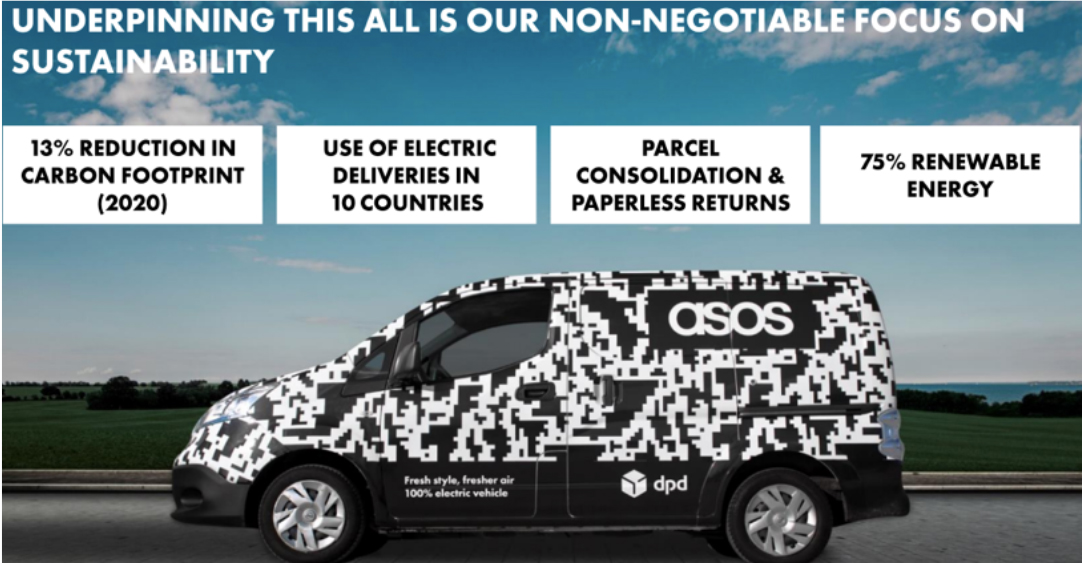 Source: Company reports
Source: Company reports [/caption]
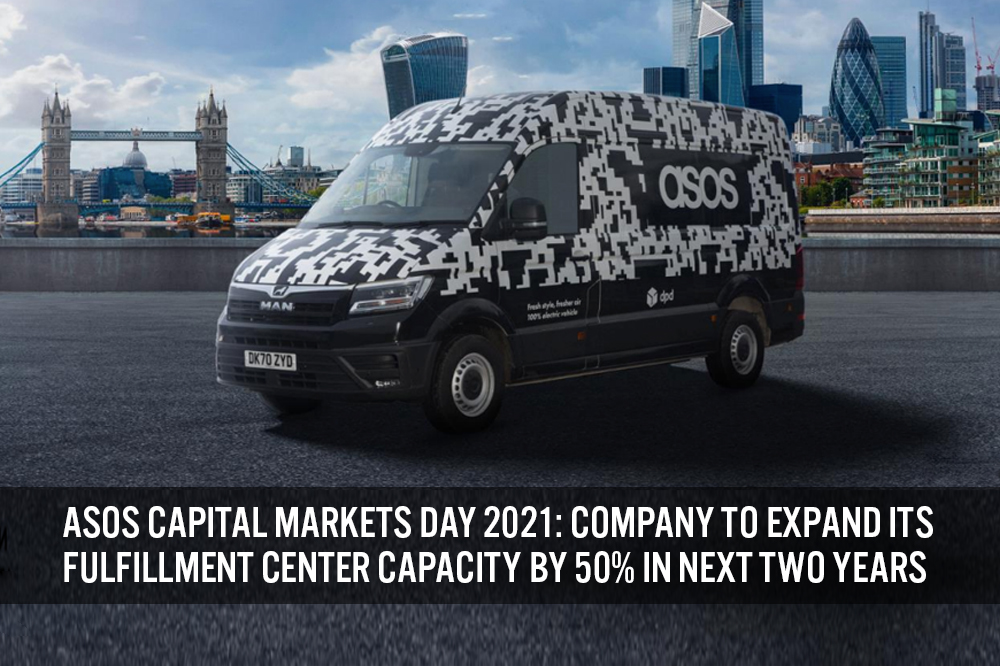
 Source: Company reports [/caption]
Automation To Drive Efficiency Improvements
ASOS management stated that the automation of distribution centers in Lichfield and Atlanta will significantly enhance the company’s delivery propositions in the UK and the US, respectively, by improving the pick and pack capacity per hour.
The company has already invested £47 million ($64 million) in automating its Euro Hub fulfillment center in Berlin, Germany, which went live in the second half of fiscal 2019. ASOS management stated that the Euro Hub automation had improved the company’s delivery propositions in Germany and France, with a 47% improvement in the number of pick units per hour and a 35% improvement for pack units. Similarly, the company noted that the automation of its Barnsley warehouse in the first half of 2015 improved the number of pick units per hour by 100% and pack units by 32%.
[caption id="attachment_131286" align="aligncenter" width="725"]
Source: Company reports [/caption]
Automation To Drive Efficiency Improvements
ASOS management stated that the automation of distribution centers in Lichfield and Atlanta will significantly enhance the company’s delivery propositions in the UK and the US, respectively, by improving the pick and pack capacity per hour.
The company has already invested £47 million ($64 million) in automating its Euro Hub fulfillment center in Berlin, Germany, which went live in the second half of fiscal 2019. ASOS management stated that the Euro Hub automation had improved the company’s delivery propositions in Germany and France, with a 47% improvement in the number of pick units per hour and a 35% improvement for pack units. Similarly, the company noted that the automation of its Barnsley warehouse in the first half of 2015 improved the number of pick units per hour by 100% and pack units by 32%.
[caption id="attachment_131286" align="aligncenter" width="725"] Source: Company reports [/caption]
2. Optimizing Transportation
ASOS stated that it is experiencing significant volatility across air and ocean freight services, and the company is looking to maintain a balance between air, road and sea networks to reduce overall transportation costs going forward—and account for sustainability initiatives, which we discuss in the next section. The company noted that the introduction of a combined sea and air route into its network in fiscal 2021 helped generate cost savings on premium airfreight.
As the ocean freight rate spot market has increased by 10 times since early 2020, ASOS has entered into a long-term freight contract with a major shipping line. However, the terms of the contract were not disclosed.
Management also stated that the company has implemented new ports of entry into Europe after facing a shortage of UK drivers of heavy goods vehicles recently.
[caption id="attachment_131287" align="aligncenter" width="725"]
Source: Company reports [/caption]
2. Optimizing Transportation
ASOS stated that it is experiencing significant volatility across air and ocean freight services, and the company is looking to maintain a balance between air, road and sea networks to reduce overall transportation costs going forward—and account for sustainability initiatives, which we discuss in the next section. The company noted that the introduction of a combined sea and air route into its network in fiscal 2021 helped generate cost savings on premium airfreight.
As the ocean freight rate spot market has increased by 10 times since early 2020, ASOS has entered into a long-term freight contract with a major shipping line. However, the terms of the contract were not disclosed.
Management also stated that the company has implemented new ports of entry into Europe after facing a shortage of UK drivers of heavy goods vehicles recently.
[caption id="attachment_131287" align="aligncenter" width="725"] Source: Company reports [/caption]
3. Sustainability Remains a Priority
ASOS’s supply chain initiatives will continue to prioritize sustainability, according to company management. For instance, it is prioritizing sea and road routes over air freight for inbound logistics, which is helping to reduce carbon emissions.
In addition, ASOS plans to expand the use of electric vehicles for delivery to more countries. In partnership with France-based parcel delivery service company DPD, the company currently utilizes electric-powered delivery in 10 countries.
Management stated that the company is making significant progress in the amount of renewable electricity it purchases to power its operations, working in partnership with UK-based renewable energy management consultancy Amber Energy. Currently, renewable energy powers nearly 75% of ASOS’s international operations.
[caption id="attachment_131288" align="aligncenter" width="725"]
Source: Company reports [/caption]
3. Sustainability Remains a Priority
ASOS’s supply chain initiatives will continue to prioritize sustainability, according to company management. For instance, it is prioritizing sea and road routes over air freight for inbound logistics, which is helping to reduce carbon emissions.
In addition, ASOS plans to expand the use of electric vehicles for delivery to more countries. In partnership with France-based parcel delivery service company DPD, the company currently utilizes electric-powered delivery in 10 countries.
Management stated that the company is making significant progress in the amount of renewable electricity it purchases to power its operations, working in partnership with UK-based renewable energy management consultancy Amber Energy. Currently, renewable energy powers nearly 75% of ASOS’s international operations.
[caption id="attachment_131288" align="aligncenter" width="725"] Source: Company reports [/caption]
Source: Company reports [/caption]